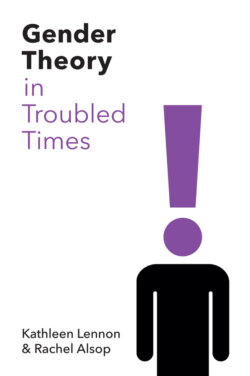Читать книгу Gender Theory in Troubled Times - Rachel Alsop - Страница 12
Gender theory under attack
ОглавлениеGender theory is complex, informed by philosophical, sociological, psychoanalytic, economic, art, literary and other theoretical insights. This book is no exception. We do our best to make the theory clear, spell out the complexity and explain what points are in contention. The theories we explore come from multiple sources, and their origins are ones which we try to acknowledge. Their importance has been made evident from collective attempts to grapple with difference and inequality. Gender theory is often criticized and required to demonstrate its relevance to activist struggles. Such struggles are trying to promote gender equality and diversity globally and to combat the harms which accrue in most, if not all, societies to women and gender non-conformist people, especially the harms of economic deprivation, sexual violence and lack of access to power. The plea from theorists has been, and from us still would be, that we have to understand how gender differences are produced and maintained if we are to counteract them. bell hooks says: ‘I found a place of sanctuary in “theorizing,” in making sense out of what was happening.’ She is countering what she perceives as anti-intellectualism in some feminist circles by arguing that critical reflection is essential for practice. She acknowledges, however, that ‘theory is not inherently healing, liberatory, or revolutionary. It fulfills this function only when we ask that it do so and direct our theorizing towards this end’ (hooks 1991).
This link of theory and practice, a point of contention within feminism, has been seized on by opponents of gender equality worldwide. Within a larger attack on intellectual inquiry, gender theory, as a sphere of academic endeavour, has become demonized by religious leaders and alt-right political parties as corrupting of the social order and dangerous if taught in any form to children or young adults. In November 2017, while attending a conference in São Paulo, Brazil, which she had helped to organize, the philosopher and gender theorist Judith Butler was faced with a protest in which her effigy was burned as a witch and she was accused of destroying the family and encouraging paedophilia!2 It appears that far-right Christian groups organized the protests, and since then the country’s far-right president, Jair Bolsonaro, has initiated measures promising to combat ‘gender ideology’. Butler afterwards commented:
the allegation is that I am the founder of ‘the ideology of gender.’ That ideology, which is called ‘diabolical’ by these opponents, is considered to be a threat to the family. There does not seem to be any evidence that those who mobilized on this occasion had any familiarity with my text Gender Trouble, published in late 1989. But they took that text to be promoting the idea that one can become any gender one wants, that there are not natural laws or natural differences, and that both the biblical and scientific basis for establishing the differences between the sexes would be, or already is, destroyed by the theory attributed to me. …
My sense is that the group who engaged [in] this frenzy of effigy burning, stalking and harassment want to defend ‘Brazil’ as a place where LGBTQ people are not welcome, where the family remains heterosexual (so no gay marriage), where abortion is illegal and reproductive freedom does not exist. They want boys to be boys, and girls to be girls, and for there to be no complexity in questions such as these. The effort is antifeminist, antitrans, homophobic and nationalist, using social media to stage and disseminate their events. In this way, they resemble the forms of neo-fascism that we see emerging in different parts of the world. (Cited in Jasnik 2017)
As Butler signals, this attack was not an isolated event. Gender theory is being targeted in many other countries. Anti-feminist campaigns, demonizing so-called gender ideology, have been mobilized in various parts of the world, from Europe to the Americas to Australia (Corrêa 2017; Corrêa et al. 2018). Gender studies has been effectively banned from universities in Hungary, a member state of the European Union (Walker 2018). In Poland, another EU member state, from a
heretofore obscure foreign concept known only to specialists, gender [is] suddenly omnipresent in the tabloids, on Facebook and in the blogosphere. It [is] … the focus of endless and heated debate … in Poland’s Roman Catholic parishes – consistently demonized in sermons as a threat to the family. Gender is presented as the heart of the ‘Civilization of death’, and as a source of perversion and degradation. Parents [are] warned that their children [are] in danger. (Graff 2014)
The role of the Catholic Church is important here. From as far back as the 1990s, when the United Nations introduced the term ‘gender’ in its documents, its use was attacked by some Catholic groups. However, in the last few years that attack has intensified. Pope Francis complains that ‘indoctrination in gender theory’ is going around the world, undermining the natural and God-given division between the sexes and suggesting that sexual behaviour is not governed by objective moral norms (Glatz 2015).
What is clear in all these attacks is that gender theory is opposed because it is viewed as denying gender essentialism, suggesting instead that the divisions between the sexes, and the distinct characteristics and social positions assigned to each, are socially malleable. Gender theory, it is claimed, involves rejecting the naturalness of heterosexuality, the primacy of the heterosexual family and the fixity of gendered identity. In fact, gender theory is a broad area of study which includes many theorists who would endorse some versions of gender essentialism. In this book, however, while discussing alternative strands of theory, we proudly hold up our hands to opposing just the kind of gender essentialism that such populist movements seek to enforce. Their engagement makes clear that these apparently theoretical debates have highly political consequences.
